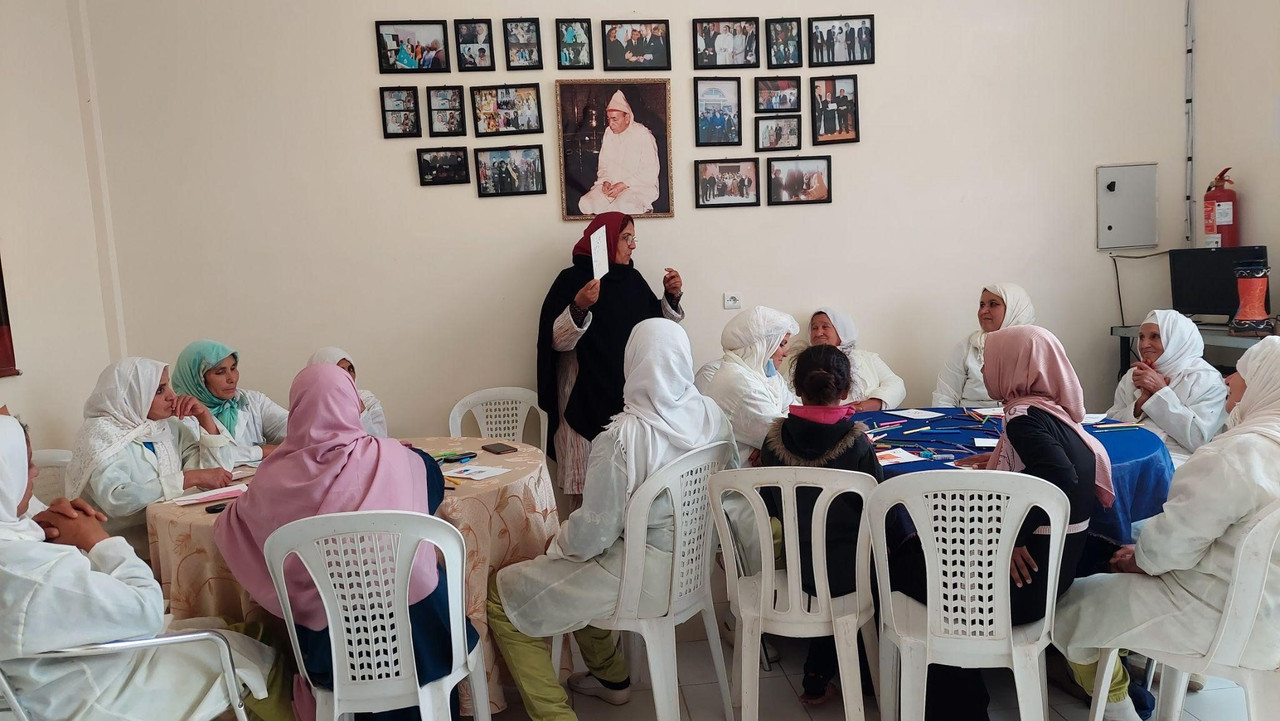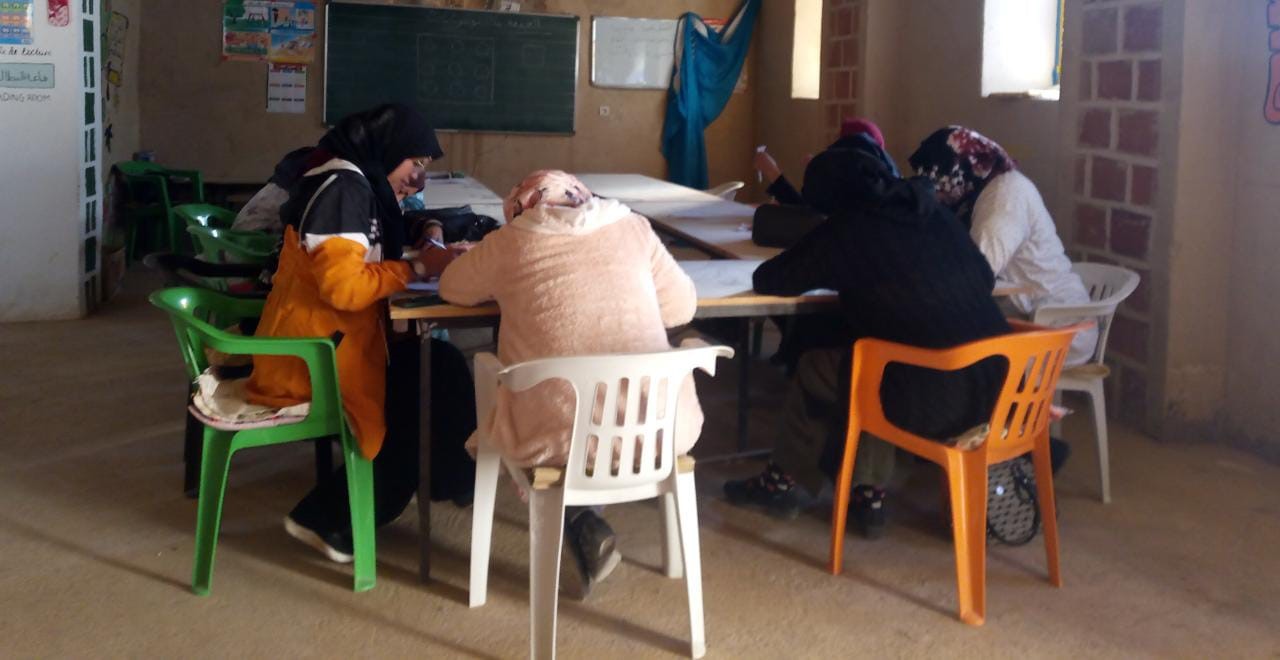Strategies for Women’s Social and Economic Empowerment

By Houria Chouhab
F2F Field Officer

The women from 3éme Méllinaire Cooperative during an empowerment workshopconducted by the coach Ibtissam Niri. Photo Credit: HAF
Women’s empowerment is the key area of development and focus of action workshops for the High Atlas Foundation (HAF) in Morocco. Since 2016, under the supervision of two coaches and six mentors, HAF has conducted 92 empowerment workshops in 20 provinces throughout the Moroccan kingdom.
The ‘Imagine’ workshops offer the opportunity for women to discover themselves and pave the way for their hidden potential to come to the surface. During a period of four days, the training sheds light on seven areas of a woman’s life: emotions, relationships, sexuality, body, money, work, and spirituality, which enable HAF’s facilitators to provide strengthening tools for the women in order to act on their needs and goals.
The topics discussed during the four-day training make the women feel like they have been on a discovery trip inside their bodies and souls. This discovery trip enables the women to get rid of their limiting beliefs and replace them with turnarounds. This transformation influences not only the women but also their surroundings, and sometimes this is already shown before the end of the four-day training. During one of the empowerment workshops, exactly on the afternoon of the third day, a 10-year-old child was knocking on the door of the workshop’s site and requested to talk to his mother. When she came back to the room, she explained that her son was impatiently waiting for her to get back home so she could tell him what she learned that day during the workshop. This story shows how the Imagine workshops conducted by the team from HAF serve as a development opportunity for families in Morocco, and how the more empowered the woman is, the better the family environment gets.
Furthermore, the team of the USAID Farmer-to-Farmer project (F2F) – a project that provides technical assistance for farmers and agricultural cooperatives – adopts this empowerment workshop as a way to build foundation and trust with the host organization first and then makes it easier for the F2F team to be aware of their needs. This is important to be able to determine the exact assignment this cooperative needs training about.
Up to the present, the F2F team has conducted 23 workshops for the benefit of 438 women in 13 provinces belonging to the four regions in which the F2F team is active: Marrakech-Safi, Beni-Mellal Khenifra, the Oriental, and Tanger-Tetouan-Al Hoceima. The empowerment workshop allows the F2F team to assess the needs of the women who are part of agricultural cooperatives and provide training conducted by both US and local volunteers.
Equally important, when the empowerment leader tackles both areas of money and work, she helps and encourages regular groups of women who live in rural areas to establish their cooperatives and walk down the road of social and economic empowerment.
To illustrate, in August 2019, HAF conducted the first Imagine workshop under the Farmer-to-Farmer project for the benefit of a group of 17 women in Al Haouz province, Marrakech-Safi region. Right after the workshop, the group of women established their cooperative that produces edible products based on cereals such as wheat and barley. Another example is the Lakdirate Cooperative in Youssoufia Province, whose 23 women initially gathered for an empowerment workshop but eventually created the first agricultural cooperative in the area. Later on, the F2F team provided them with technical assistance in how to develop a business plan for a tree nursery. The business plan was soon submitted to the donors who immediately and fully funded the nursery project.
Another example is when the Imagine workshop was conducted in January 2020 for the benefit of Alkhayr Cooperative women in the Oriental region. These women had already created a cooperative but were not sure about the activity they wanted to do. The workshop helped them focus on two main fields, and the F2F instantly provided technical assistance for this. Today, Al Khayr cooperative owns a tree nursery that is home to different fruit trees, medicinal and aromatic herbs, and provides work opportunities for 14 women in the village.
HAF’s F2F project is now concentrating on the northern region of Morocco to expand the number of workshops and projects in the area. An Imagine workshop has already been conducted in Al Hoceima province for the benefit of 25 women belonging to different women’s cooperatives. The F2F team will continue to organize more empowerment workshops, assist the needs of these co-ops and provide more technical assistance in this region.
Another important aspect through which HAF seeks to empower women is eradicating illiteracy. The foundation embraces an literacy project in partnership with the European Union (EU), and it is implemented in both the Marrakech-Safi and Beni-Mellal Khenifra regions. This EU project seeks to educate 800 women over a period of two years, and this also provides job opportunities 40 instructors and internships for 20 university students who are in charge of monitoring & evaluation (M&E).
The process of this project starts by conducting an Imagine Workshop for women first to pave the way for introducing the literacy program and realizing its importance. Afterward, an instructor from the same community is selected to be trained in alphabetization and then begin the classes for the women of the community. Another advantage of this project is enabling children under the age of five years old to attend pre-school classes for a year. This is considered a bonus for the rural areas in both regions and a call for familial empowerment through education.

Women of Tighermine cooperative in Azilal Province benefitting from literacy classes.
Credit: EU Beni-Mellal Khenifra / HAF
In summary, the development of a society is closely associated and connected to women’s empowerment, and that is the purpose of the High Atlas Foundation through its empowerment workshops and projects.